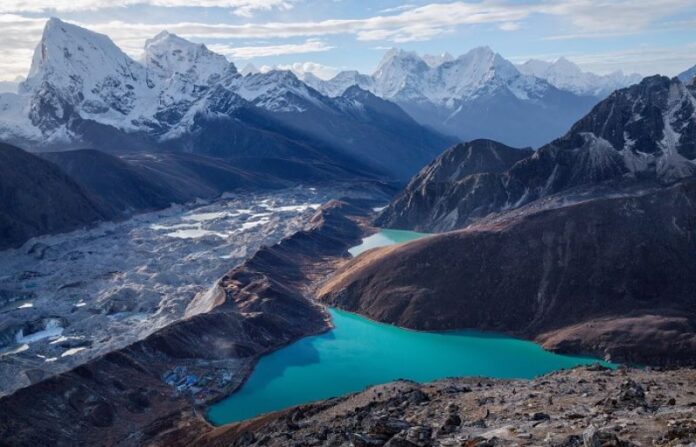The International Centre for Integrated Mountain Development (ICIMOD) has responded to a series of alarming reports from United Nations agencies, confirming that many glaciers in the Hindu Kush Himalaya (HKH) region will not survive the 21st century. The reports, published on the first-ever UN World Glacier Day, highlight the catastrophic consequences of glacier melt on water, food, energy, and livelihood security in the region, with ripple effects felt across Asia and beyond.
According to findings from UN Water, UNESCO, the World Meteorological Organization (WMO), and the World Glacier Monitoring Service (WGMS), the HKH glaciers—often referred to as the “Third Pole” due to their extensive ice reserves—are melting at an unprecedented rate. Five of the past six years have seen the most rapid glacier retreat on record. Experts warn that this rapid melt will lead to extreme weather events, water shortages, food insecurity, ecosystem disruptions, and even geopolitical conflicts.
A Crisis Unfolding in Real-Time
ICIMOD Director General Pema Gyamtsho called the reports a stark warning to global leaders. “These reports serve as a wake-up call for anyone who thought they were immune to the catastrophic losses of snow and ice that global warming is unleashing on Earth’s mountains,” he said. “With up to 60% of the world’s freshwater originating in mountains, we are all ultimately downstream.”
The UN Water report, Mountains and Glaciers: Water Towers, states that the water resources from the HKH region are “literally melting away before our eyes.” The loss of glaciers threatens the stability of 10 major transboundary river basins, including the Indus, Ganges, and Brahmaputra, which collectively support nearly two billion people.
While in the short term, melting glaciers contribute to increased river flows, creating risks of floods and glacial lake outbursts, the long-term consequences are dire. As glaciers retreat more rapidly from 2050 onward, the report predicts severe droughts, water scarcity, and major disruptions to agriculture and hydropower systems.
Among the rivers most affected by cryosphere changes is the Indus, which relies on glaciers and snowmelt for 70% of its streamflow. Faisal Mueen Qamer, ICIMOD’s River Basins lead, warned that changes in Pakistan’s 13,000 glaciers are already impacting agriculture, industry, and energy production. “The Indus is often referred to as the lifeline of Pakistan. Upstream changes in glaciers are already altering water availability, making better data collection and climate diplomacy essential,” he said.
Sher Muhammad, ICIMOD’s Remote Sensing Specialist, emphasized that decreasing snowfall in the HKH region poses a major threat to food and water security. “Lower snow accumulation is a growing concern, particularly for communities directly dependent on snowmelt,” he stated. “This requires urgent intervention and proper management plans to offset future water stress.”
ICIMOD has urged world leaders to take immediate action to cut carbon emissions and invest in climate adaptation strategies to limit the worst impacts of glacier melt. “The safety of billions of people, including some of the most vulnerable, depends on deep emissions reductions and regional cooperation,” Gyamtsho stressed.
The organization is advocating for increased climate finance for mountain regions, improved water management, and transboundary collaboration between nations. Without urgent intervention, experts warn that the rapid loss of glaciers will trigger cascading crises—floods, droughts, economic instability, and forced migration—affecting millions across Asia and beyond.
As the climate crisis accelerates, ICIMOD’s message is clear: the time to act is now. Without swift and coordinated global efforts, the melting of the HKH glaciers will have irreversible consequences for people, economies, and ecosystems worldwide.
